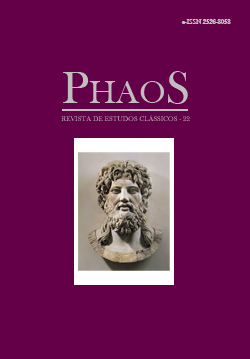Resumen
Este artículo pretende proponer que la antítesis Apolo-Hades presente en el fragmento 271 de Aesthesire (Davies & Finglass), vista desde el contexto de su fuente de transmisión (Plutarco, Do E de Delphi), pueda admitir al público de Plutarenecque un significado renovado, es decir, que Apolo y Hades también se distingan por eso, se especula, siendo un dios asociado con el Sol, y este, conocido, el dios del inframundo, sentido poco probable para el público contemporáneo a la Estemia. Para ello, analizamos los elementos internos y externos que constituyen la oposición en el poema y los situamos bajo la perspectiva de plutarc. El análisis se centra en aspectos temáticos e intertextuales, dados los pocos versos que quedaban del fragmento. Así, se pretende mostrar cómo la imagen de Apolo como dios sol, aunque tiene bases dudosas según Plutarco, forma parte de sus indagaciones, refuerza su tesis sobre la pureza de Apolo y establece una nueva faceta en oposición al Hades.
Citas
Fontes primárias
CAMPBELL, David. (ed., trad.). Greek lyric III. Stesichorus, Ibycus, Simonides, and others. Cambridge: University Press, 1991.
DAVIES, Malcom; FINGLASS, Patrick J. (eds., trads.). Stesichorus. The poems. Cambridge: University Press, 2014.
MOST, Glenn W. (ed.; transl.). Hesiod, Theogony. Works and days. Testimonia. Cambridge: Harvard University Press, 2006.
NAUCK, August. (ed.). Tragicorum Graecorum fragmenta. Hildesheim: Olms, 1964.
PATON, William R., et al. Plutarchus Moralia. III. Leipzig: Teubner, 2001.
BABBITT, Frank C. Plutarch: Moralia. V. Cambridge: Harvard University Press, 1936.
RAGUSA, Giuliana. (org., trad.). Lira grega. Antologia de poesia arcaica. São Paulo: Hedra, 2013.
WERNER, Christian. Homero, Ilíada. São Paulo: Ubu, 2018.
WERNER, Christian. Homero, Odisseia. São Paulo: Ubu, 2018.
WEST, Martin L. Homeri Ilias, vol. I-II. Munich, Leipzig: Saur, 1998-2000.
WEST, Martin L. Homeric hymns, Homeric apocrypha, lives of Homer. Cambridge: Harvard University Press, 2003.
WEST, Martin L. Homerus Odyssea. Berlin: De Gruyter, 2017.
Estudos
BERTANY, Edward. The best of the Olympians. The character of Apollo in the Homeric epics and hymns. 2018. 224 p. PhD thesis (Classics) – University of Washington, Seattle, 2018.
BURKERT, Walter. Greek religion. Archaic and Classical. Trad.: J. Raffan. Oxford: Blackwell, 1985.
CURRIE, Bruno; RUTHERFORD, Ian. (eds.). The reception of Greek lyric poetry in the ancient world. Transmission, canonization and paratext. Studies in archaic and classical Greek song, vol. 5. Leiden: Brill, 2020.
DETIENNE, Marcel. Apollon le couteau à la main. Une approche expérimentale du polythéisme grec. Paris: Gallimard, 2009 (1.ed.: 1998).
DOWDEN, Ken. Olympian gods, Olympian pantheon. In: OGDEN, Daniel. (ed.). A companion to Greek religion. Oxford: Blackwell, 2007.
FONTENROSE, Joseph E. Apollo and the Sun-God in Ovid. The American Journal of Philology, vol. 61, n. 4, 1940, p. 429-44. Disponível em: https://www.jstor.org/stable/291381. Acesso em 14 out. 2021.
GANTZ, Timothy. Early Greek myth. A guide to literary and artistic sources. Baltimore; London: Johns Hopkins University Press, 1993.
GRAF, Fritz. Apollo. London: Routledge, 2009.
HARDWICK, Lorna. Reception studies. Greece and Rome. New surveys in the classics, vol. 33. Oxford: University Press, 2003.
MARTINDALE, Charles; THOMAS, Richard F. (eds.). Classics and the uses of reception. Oxford: Blackwell, 2006.
MONBRUN, Philippe. Apollon: de l’arc à la lyre. In: BRULÉ, Pierre; VENDRIES, Christophe (eds.). Chanter les dieux. Musique et religion dans l’Antiquité grecque et romaine. Rennes: Presses Universitaires, 2001. p. 59-95.
NEER, Richard. Delphi, Olympia, and the art of politics. In: SHAPIRO, H. Alan (ed.). The Cambridge companion to archaic Greece. Cambridge: University Press, 2007. p. 225-64.
PARKER, Robert. Miasma. Pollution and purification in early Greek religion. Oxford: Clarendon Press, 1996. (1.ed.: 1983).
RABEL, Robert. Apollo as a model for Achilles in the Iliad. AJPh 111, n. 4, 1990. p. 429-40. Disponível em: https://www.jstor.org/stable/295239. Acesso em 14 out. 2021.
RUTHERFORD, Ian. Pindar’s paeans. A reading of the fragments with a survey of the genre. Oxford: University Press. 2001.
SILVA, Maria A. Plutarco e Delfos. Praesentia, vol. 13, 2012. Disponível em: http://erevistas.saber.ula.ve/index.php/praesentia/article/view/4233. Acesso em 14 out. 2021.
STADTER, Philip. Plutarch: diplomat for Delphi? In: BONS, Jeroen; KESSELS, Ton; SCHENKEVELD, Dirk; BLOIS, Lukas. (eds.). The statesman in Plutarch’s works. Vol. I: Plutarch’s statesman and his aftermath: political, philosophical, and literary aspects. Leiden: Brill, 2004. p. 19-31.
WILAMOWITZ-MOELLENDORFF, Ulrich von. Griechische verskunst. Berlin: Weidmann, 1921.
Obras de referência
CHANTRAINE, Pierre. Dictionnaire étymologique de la langue grecque. Histoire des mots. I-IV. Paris: Éditions Klincksieck, 1968-79.
LIDELL, Henry G.; SCOTT, Robert; JONES, Henry S. Greek-English lexicon with a revised supplement. 9ª ed. Oxford: Clarendon, 1996.

Esta obra está bajo una licencia internacional Creative Commons Atribución-NoComercial-CompartirIgual 4.0.


